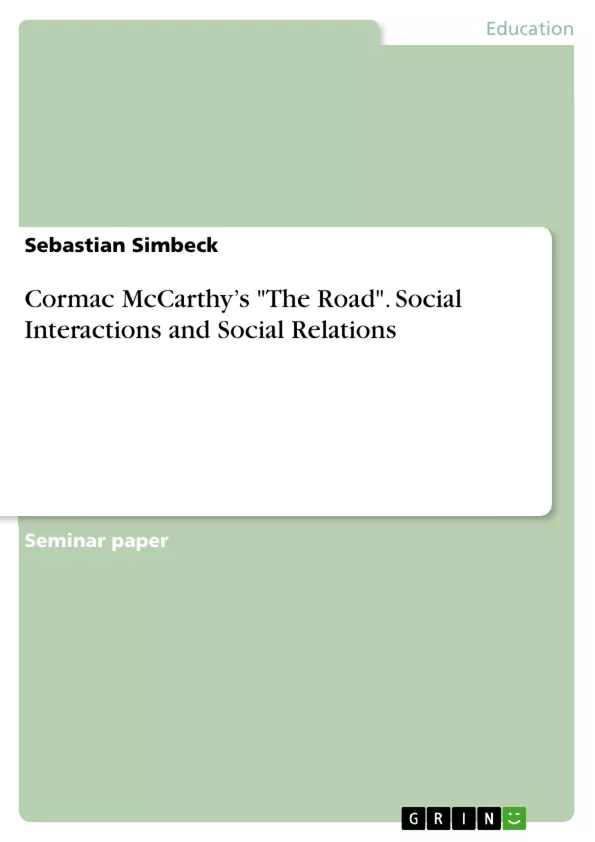In this essay I’d like to take a look at social interactions of individuals who find themselves in a world where known values, believes and rules seem to be invalid and where the individual survival seems to be the only aim to strive for. But is survival the only need of people? The Road, with its cold, bitter and ashen world, where ethics and morale are lost, where “society”, as we know it, is completely absent is a good basis for this research.
“Maybe you’ll be good at this. I doubt it, but who knows. The one thing I can tell you is that you won’t survive for yourself. I know because I would never have come this far. A person who had no one would be well advised to cobble together some passable ghost. Breathe it into being and coax it along with words of love. Offer it each phantom crumb and shield it from harm with your body.” (McCarthy, The Road)
“Action is rational in so far as it pursues ends possible within the conditions of the situation, and by means, which, among those available to the actor, are intrinsically best adapted to the end for reasons(…).” (Parsons, 1937)
These two epigraphs, the first from Cormac McCarthy’s “The Road” and the second from Parsons “Structure of Social Action” give us a slight hint about the importance of social relations and interactions and their outcomes. As a consumer of this kind of post-apocalyptic media you’re thrown into these settings by either waking up from a dream or by regaining consciousness. The setting and the “new world order” are already fixed. Either people try to survive for their own while searching and hoping for “others” in order to have a higher chance of surviving, or they are already a part of a community which fights against others in order to survive. In both cases, on the other hand, those “communities” already do exist and in both cases it’s always a question of the “good” against the “bad”. While dealing with post-apocalyptic media several questions came to my mind. How came those communities and groupings and into being? Which role do social interactions and social relations play in order to form a new kind of social system(s), after the (previous-) known world-order got destroyed by an apocalyptic event? Social sciences usually deal with the reasons of social interactions and relations. But they depend on existent fixed social values, rules, laws, morale and religious believes, since those aspects influence the actions of each and every individual.
Inhaltsverzeichnis (Table of Contents)
- Social Interactions and Social Relations
- Social Interaction and Social Order
- Social Interactions and Social Relations in "The Road"
Zielsetzung und Themenschwerpunkte (Objectives and Key Themes)
This essay explores the significance of social interactions and relations in the context of a post-apocalyptic world, specifically using Cormac McCarthy’s novel “The Road” as a case study. The essay examines how individuals form and navigate social systems when traditional values, rules, and beliefs are absent. The main objective is to understand the role of social interaction in creating and maintaining a sense of social order within a chaotic and unpredictable environment.
- The impact of social interactions on individual survival in a post-apocalyptic world.
- The formation and dynamics of social groups in the absence of established social structures.
- The role of ethics and morality in shaping social interactions and relationships.
- The influence of pre-existing social norms and values on individual behavior in a new social order.
- The exploration of identity in a world where traditional social structures have collapsed.
Zusammenfassung der Kapitel (Chapter Summaries)
- The essay begins with a discussion of the importance of social interactions and relations in the context of post-apocalyptic media. The author introduces key concepts from sociology, such as social interaction, social groups, and social order, and highlights their relevance to understanding the dynamics of survival in a world without established norms.
- The essay then delves into the theories of social interaction and social order, drawing on the works of key sociologists like Garfinkel, Parsons, and Fromm. These theories provide a framework for understanding how individuals develop expectations, values, and norms within social systems, even in the absence of established social structures.
- The essay then examines the role of social interactions in Cormac McCarthy's novel "The Road". The focus is on the father-son relationship and how it reflects the challenges and complexities of survival in a post-apocalyptic world. The author explores how the characters navigate social interactions with other individuals and groups, highlighting the impact of different values, beliefs, and behaviors on their survival strategies.
Schlüsselwörter (Keywords)
The essay primarily focuses on the concepts of social interaction, social relations, social order, and post-apocalyptic fiction. It also explores related concepts such as identity formation, ethics, morality, and the influence of pre-existing social norms on individual behavior in a new social order. The essay aims to provide a deeper understanding of how social interaction can create and maintain a sense of community and order in a world where established systems have collapsed.
- Citation du texte
- Sebastian Simbeck (Auteur), 2014, Cormac McCarthy’s "The Road". Social Interactions and Social Relations, Munich, GRIN Verlag, https://www.grin.com/document/449841



